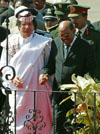
Just a week after Qaddafi’s crackdown on protestors in Libya, the U.N. Security Council authorized sanctions against the regime and referred the “Brother Leader” to the International Criminal Court, alleging war crimes. The United States and its allies are considering imposing a no-fly zone over Libya – supported by the usually reticent Arab League – to prevent Col. Gaddafi from continuing to use his fighter jets to bomb opposition groups and civilians.
Mobilizing within “weeks” to deploy pressures is lightning speed, as people familiar with the international community’s efforts to quell the Sudanese government attacks on civilians in Darfur know well. The same cocktail of pressures was discussed, and to a limited degree implemented, in Sudan. But by contrast it took years to get the U.N. Security Council to act on Sudan, with disappointing and largely ineffective results.
Drawing parallels between the two cases, it’s clear that when the international community is of one mind, as in the case of Libya, it can move quickly to respond when civilian lives are at risk and use the tools at its disposal to deter a government from targeting its own people. Not that the actions thus far toward Libya have had a measurable impact saving civilian lives, but the swift and unanimous actions by the U.N. Security Council show an encouraging new example of the international community working to prevent atrocities. (However, it must be noted that some of these deterrence factors may have a limited effect in Libya because Qaddafi has proven to not be the most predictable actor, or, as New York Times columnist Nicholas Kristof put it recently, “he’s nuts.”)
The Libya case marks only the second time that the Security Council has utilized its authority to refer a case to the International Criminal Court. Only in the case of Sudan has the Security Council used this discretion, also when confronting allegations of atrocities orchestrated by a sitting head-of-state. Even the United States voted in favor of the ICC investigating Qaddafi and his advisors, while in the past it has abstained when actions regarding the ICC have arisen. (As they often do, China and Russia abstained.) Moving quickly to demonstrate to Qaddafi and his cabal that their actions are being closely watched and will figure into an ICC investigation could serve as a deterrent against further aggression, as well as ratchet up the stakes for others considering whether to carry out Qaddafi’s orders.
By comparison, the International Criminal Court was a new institution when the violence and ethnic cleansing began in Darfur, but it wasn’t until 2005 that the U.N. referred the case to the ICC, calling for the court to investigate the previous two and a half years of human rights crimes, beginning in July 2002.
The U.N. Security Council’s engagement on Darfur got off to a halting start in 2004 as some member states sought to downplay the government’s hand in the violence as a peace agreement with South Sudan looked imminent. The first resolution specifically addressing Darfur came in July 2004, optimistically “welcoming the commitment by the Government of Sudan to investigate the atrocities and prosecute those responsible.” The resolution imposed an arms embargo, (though it did not task any body with enforcement,) and called for continued international monitoring of the situation and the government’s progress to end the conflict. While the council committed to “remain seized of the matter” of Darfur, the onus was placed on the Sudanese government – despite the fact that the government’s own army was bombing Darfuri villages and arming the very militias they were being called upon to disarm and hold accountable.
Three months later, the Security Council threatened to impose sanctions, giving the Sudanese government yet more time to show a commitment to protecting civilians and to end ongoing attacks by Janjaweed and the army. In March 2005, council members authorized an expanded regime of sanctions – including an arms embargo, asset freezes, travel bans – and appointed a panel of experts to monitor implementation. A year later – and four years after the genocidal campaign in Darfur began – this U.N. group of experts recommended a no-fly zone for Darfur, a controversial proposal that was never implemented. The Security Council voted last summer to strengthen sanctions, but reports of serious violations of the arms embargo in particular have emerged.
In stark contrast, The New York Times broke the news on February 21 that Qaddafi had deployed helicopters and warplanes to crush the Libya uprising; by the end of the week, the Security Council had taken a decisive stand, and individual governments were speaking out unequivocally against the Libyan government’s action and preparing to intervene if necessary.
As the Qaddafi regime vows to fight “to the last bullet,” the situation in Libya will likely deteriorate further before it improves. The international community will have to be attentive and nimble to address new challenges as they arise. But the initial swift and relatively unified response is an important precedent for building an infrastructure for preventing atrocities.
The same week as the U.N. resolution on Libya, Vice President Biden spoke at the U.S. Holocaust Memorial Museum and condemned the violence, invoking the Responsibility to Protect. “We’ve made the Responsibility to Protect—the simple but novel concept that states must shield their populations from atrocity—a core element of our national security strategy,” Biden said. “We can’t do everything, but there is a lot we can do and in the past we haven’t done.”
Let’s hope that the international response to Libya not only sets a new standard when it comes to protecting civilians and preventing atrocities, but that it sets a new precedent for how the world responds in places like Darfur, where violence against civilians continues outside of the media spotlight.
Photo: Libyan leader Moamar Qaddafi and Sudanese President Omar al-Bashir walk hand-in-hand in Khartoum, 2006 (AP)

